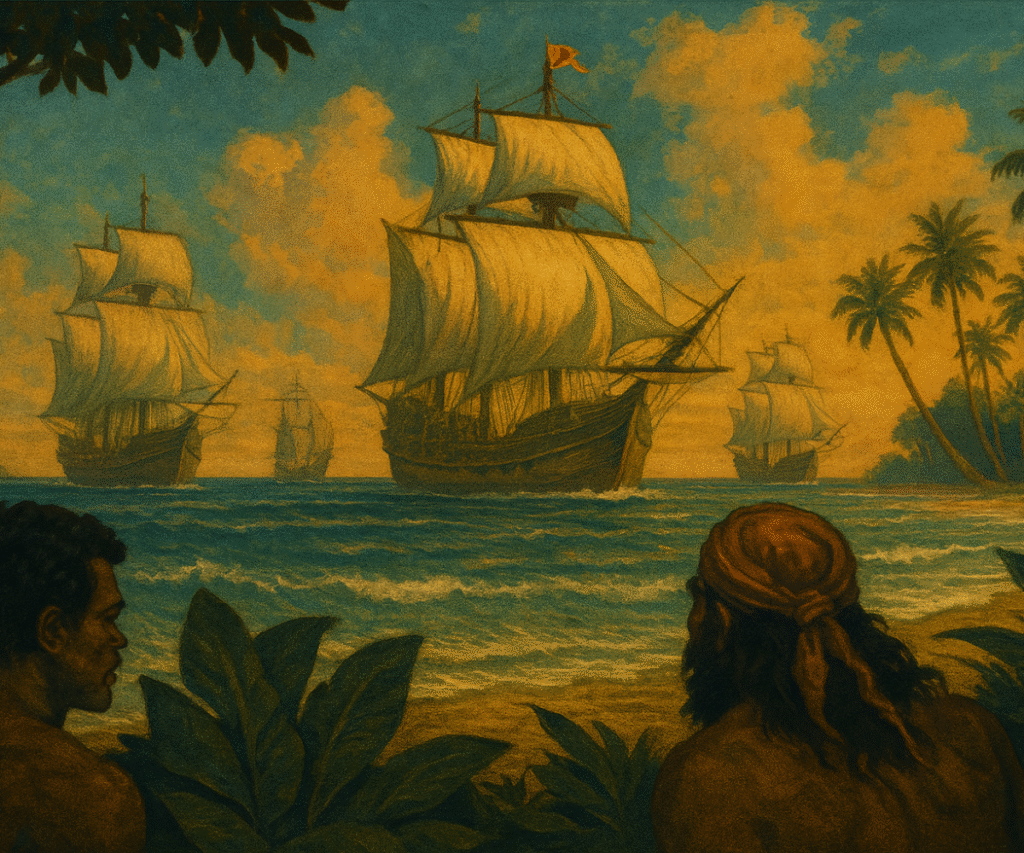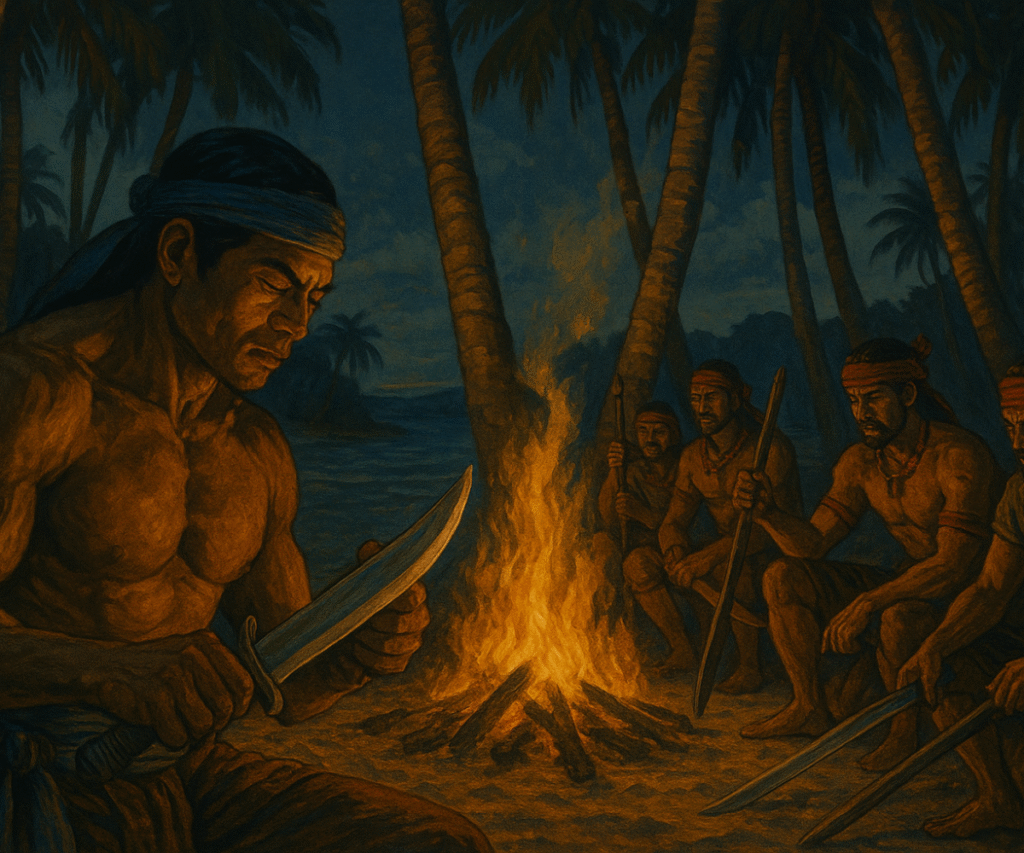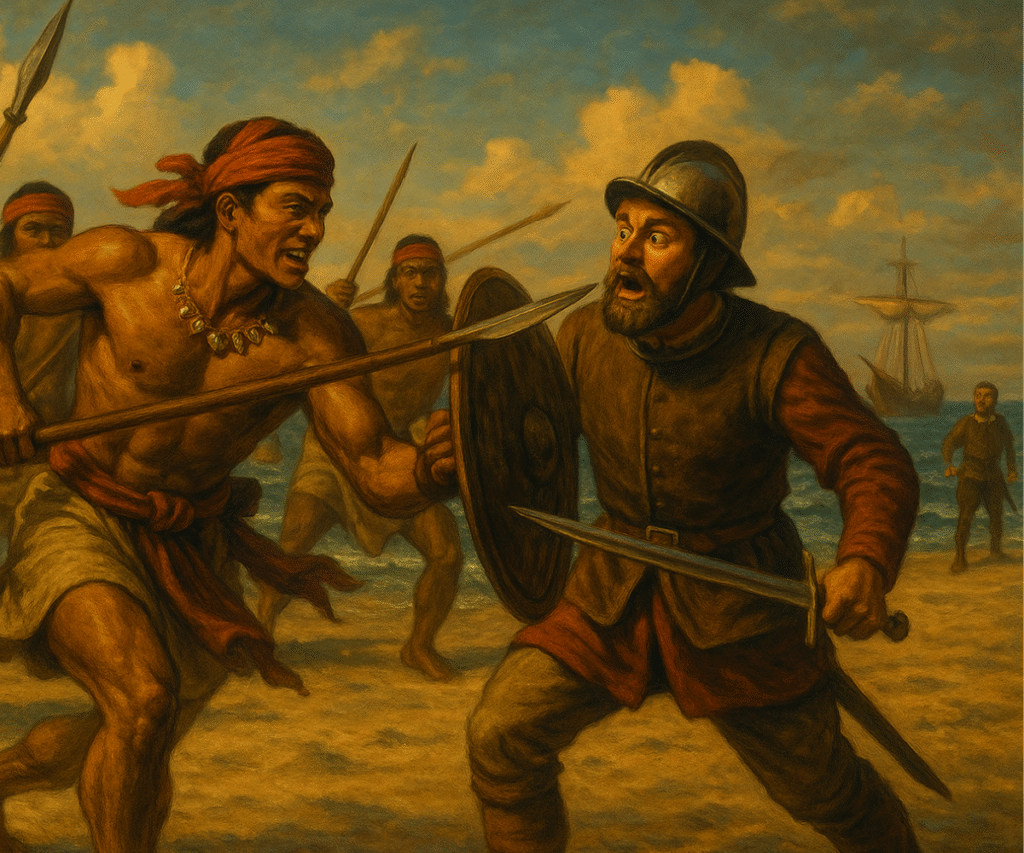Magellan’s Last Night:
A Filipino Tale of Travel Gone Wrong
Told to Me Over Beers in Mactan by Bayani

I. Beers with Bayani
A couple of years back, i was vacationing in the Philippines where i ended up visiting the island of Mactan. It started with a San Miguel at a beachfront bar. I was about 9 beers deep, toes in the sand, when an old Filipino man slid into the seat beside me.
He had the kind of face you only earn by living outside – leathered, lined and sun-baked. His name was Bayani and he spoke with that mix of mischief and certainty only old fishermen seem to have. We got to talking about travel and about what it means to be free. At some point, I must’ve mentioned Magellan.
Bayani’s eyes lit up.
“You want to know how he really died?” he said, reaching for another beer without waiting for a reply. “Not the schoolbook version. The real one. The version we tell here.”
I leaned in. He grinned.
And just like that, the sky got darker, the waves got quieter and the story began…
II. Foreign Ships, Fancy Flags and a Misread Welcome
Bayani leaned in
“They came floating in like they owned the world,” he said. “Three big ships, sails full, crosses everywhere. We’d never seen anything like it.”
At first, nobody panicked. The islanders gathered on the shore. The sails were flapping, the sun was shining and here came the foreigners, beet red and sweating, shouting in a language nobody could understand.
“They were wearing armor,” Bayani said, “In this heat! We thought they were sick in the head.”
Magellan stepped onto the beach like a man walking into his own house. No greetings and no manners. Just planting flags and pointing at the horizon like he’d just discovered it. He waved a sword in one hand and a cross in the other and according to his interpreter, he was going on about his king.
“We already had a king,” Bayani said. “Didn’t need another.”
Still, the locals didn’t strike. Not yet. They were polite, even helpful. They offered food and traded a bit. Smiled the way you do when a guest overstays their welcome but you haven’t decided if it’s worth the trouble to say so.
“But then,” Bayani added, “they started getting ideas.”
Ideas about land, about God and about obedience.
And that’s when the trouble started.
III. Lapulapu:
The Chief Who Didn’t Kneel
Bayani’s voice dropped
“Lapulapu wasn’t like the other datus,” he said, gazing past the shoreline like he expected the man to walk out of the tide. “He didn’t bow and he didn’t smile if he didn’t mean it.”
He wasn’t the biggest man on the island or the loudest, but he was the one everyone listened to. He was well respected amongst his people. So when word came that some pale-skinned wanderer was going around making chiefs kneel, Lapulapu just chewed his betel nut and spit in the sand.
“Let him try.”
Bayani grinned like it was his favorite part of the story.
Magellan had already made friends with another chief on a nearby island, one of those eager types who thought siding with the foreigners might earn him some power. So he offered to help Magellan “bring Lapulapu in line.” A bad idea on paper. Worse in practice.
“They thought Lapulapu was just another islander with a fancy name,” Bayani said. “But he’d fought pirates, rival tribes and even Moro raiders. He didn’t flinch at gunpowder and he sure as hell didn’t flinch at some sun burnt foreigner waving a crucifix.”
Magellan sent a message demanding Lapulapu submit to the king of Spain. The reply was short.
“Tell your king I already have a god, and a paddle.”
A challenge or a warning. Depends on how smart you are.
And Magellan? Well… he wasn’t.
IV. Tensions Rise:
Faith, Power and Pride
Bayani shook his head like it still amazed him
“Magellan thought he was on a mission from God. Cross in one hand and a sword in the other, like he could baptize and conquer at the same time.”
By then, things were getting testy. The Spanish had handed out gifts that weren’t asked for. Preached sermons no one could understand and started making rules in a place that didn’t need them. They acted like bringing the gospel of Jesus meant the rest of the island should fall in line.
“They kept saying we were lucky to be found,” Bayani said. “We didn’t even know we were lost.”
Lapulapu saw the writing on the reef. He wasn’t angry, just unmoved. He made no grand speeches. Just gathered his men and prepared to do what islanders have always done when someone tries to take what’s not theirs.
Still, Magellan believed his guns, armor and God would make the island bend. He even brought translators to deliver long-winded threats about the Spanish crown. It didn’t help.
“Your chief will kneel,” the messenger said.
Bayani smiled. “Lapulapu sent back a spear. No words, Just a spear.”
It was settled then. At dawn, Magellan would lead his men to Mactan, not to negotiate, but to punish.
“And that,” Bayani said, leaning back in his chair, “was the moment history decided to sharpen its teeth.”
V. The Night Before:
Calm Before the Storm

history was made on the shores of Mactan.”
Bayani took a swig of his beer
“The night before the battle,” he said, “was too quiet. You ever hear the wind go still like it’s holding its breath? That’s how it felt.”
The Spanish were busy. Armor being polished. Muskets cleaned and stacked. Priests mumbling prayers while the soldiers sharpened blades and told each other how easy tomorrow would be.
“They thought we were savages with sticks. They thought Lapulapu would crawl to them on hands and knees, groveling at their feet.”
But just across the water, by torchlight on the sands of Mactan, another kind of preparation was happening.
No speeches. No ceremony. Just steady hands tying rattan grips, checking barbed spears and moving silently among the palms. Warriors smeared with ash. Eyes calm and alert. They’d fought in the jungle and they’d fought in boats. They knew the tides and the reefs like the back of their hands.
“Lapulapu didn’t say much,” Bayani added. “Just sat by the fire, listening to the wind. He knew the sea would be shallow at dawn. Knew they’d have to wade through coral and current to reach him.”
No one sang. No one shouted. But every man there knew exactly what to do.
“They were islanders defending their island,” Bayani said. “The land itself was on their side.”
And by the time the roosters called and the tide pulled back, everything was already in place.
VI. Battle of Mactan:
Rocks, Reefs and Ruin

“Magellan landed at low tide,” he said. “Didn’t even realize the sea was warning him.”
The Spanish had to leap from their boats and wade through sharp coral and knee-deep water, slipping on seaweed and cursing the heat. Their heavy armor dragged them down, muskets jammed from sea spray and every step was a stumble.
“They thought they’d scare us with guns,” Bayani said. “Only problem? Their guns didn’t work.”
From the shore, Lapulapu’s warriors waited – barefoot, fast and quiet. No fancy lines and no trumpets. Just sharpened spears and a thousand years of knowing how to move through water better than anyone in boots ever could.
Then the ambush began.
“They came up screaming like ghosts from the trees,” Bayani said. “Our men threw stones and then spears. Then they came running.”
Magellan stood tall at first, sword raised, shouting orders no one followed. His men panicked. One got tangled in sea vines, another dropped his blade trying to reload. A third tripped and cracked his skull on a rock. It was over before it began.
Lapulapu didn’t rush. He walked straight through the chaos like a man heading to the shore for fish.
Magellan looked up just in time to say something dramatic. Then someone hit him in the leg with a kampilan. He stumbled hard and turned to see most of his men already sprinting for the boats.
“Stop, you cowards!” he yelled.
Then finally, he ran for his life.
He didn’t make it far. He looked back and there was Lapulapu, silent and steady, with warriors closing in fast behind him.
“They cornered him like a pig in a pen,” Bayani said. “Surrounded him and brought him down.”
They descended on him with blades, not stopping until the sand itself began to turn red. One of Lapulapu’s men burst out laughing, not from cruelty, but from the sight of the last Spaniard looking back, pale as fish belly, watching the whole thing unfold in horror.
“He came with a flag and a cross,” Bayani said. “but he left in pieces.”
VII. Aftermath and Reflection:
What I Learned from Bayani
I sat there for a moment staring out over the waves. Bayani just leaned back, watching me. There was no gloating in his tone. No bitterness either. Just a calm and steady pride. Like a man telling you how his grandfather taught him to fish.
After the Spanish retreated in panic, one of their officers tried to negotiate. They offered goods. Weapons, trinkets and even gold, in exchange for Magellan’s body. But Lapulapu and his men said no.
“He chose to die on our shore,” Bayani said. “That’s where he stays.”
“We buried him the way we would any man,” Bayani added. “His arrogance cost him his life and we’ve been laughing about him ever since.”
He stood up, brushed the sand off his legs and gave me a look like a father passing down a lesson without needing to raise his voice.
“You want to travel far? That’s good. See the world. Drink its water. Learn its names. But don’t walk into someone’s home thinking it’s yours just because you sailed to it.”
I nodded.
The waves were calm that night. But I could still hear the sound of that reef, sharp and silent, waiting for the next man who forgets where he is.


What a great story ! What a great lesson. Thanks PassportBros!